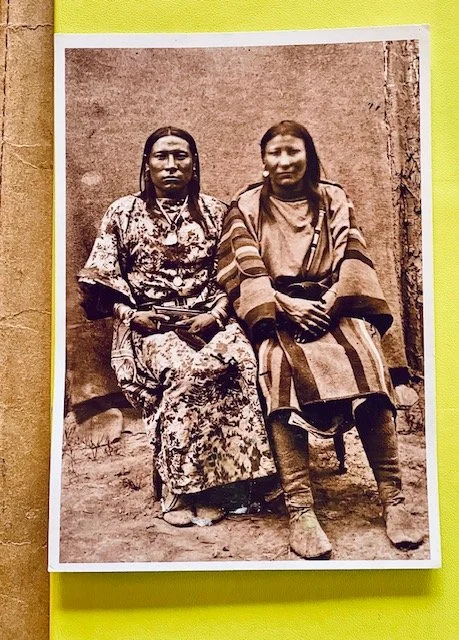The black and white postcard above has been in my library as long as I can remember; I never studied it closely, thinking it was an old late nineteenth century - early twentieth century photograph of two native women, two sisters or female family members. Reminding me of two recent Higher Haven visitors, two sisterly gals who were happy to reconnect at a summer Ceremonial gathering, I corresponded with them later by mail, bringing the old photo to mind. Addressing it, I was surprised to find this blurb on the back:
“SQUAW JIM, Osch-Tisch ‘Finds Them and Kills Them’ (1854-1929). This remarkable photograph is titled ‘Squaw Jim and His Squaw’. On the left is Squaw Jim, a biological male in woman’s attire — a Crow Berdache or male homosexual afforded distinctive social and ceremonial status within the tribe. In addition to the special attributes that distinguished the berdache or boté, Squaw Jim served as an enlisted scout at Fort Keogh and achieved a reputation for bravery when he saved the life of a tribesman at The Battle of Rosebud, June 17th, 1876. This 1877 photo is the earliest known of a North American Indian Berdache.”
Interesting to note that my Teacher’s Teacher Chief Leonard Emmanuel Crowdog’s family was at the Rosebud battle, still residing to this day in south central South Dakota, USA. The Lakota people, too, had their Winktes, the contraction of an old Lakota word, winyanktehca, meaning '[wants] to be like a woman', historically, the winkte considered a social category of male-bodied individuals who adopt the clothing, work, and mannerisms that Lakota culture usually considers feminine. However, in contemporary Lakota culture, winkte is usually used to refer to a homosexual man. Like the Crow, the tribe regarded them as regular members of the community, and not in any way marginalized for their status, while other accounts held the winkte as sacred, occupying a liminal, third-gender role in the culture, and born to fulfill ceremonial roles that could not be filled by either men or women.
This regard in traditional cultures for gender bending tribal members made a recent appearance in a Google Doodle focused on We’ wha, a well-recognized member of the Zuni tribe. “The late We’wha was an individual who exemplified one of the core values of the Zuni people,” goes the backstory, “And that was compassion.” Born in 1849 in Zuni, New Mexico, in the northwest corner of the state that is the tribe’s home, We’wha was born a male but identified as lhamana or female. The tribe’s first ambassador, she was accepted for who she was and visited Washington D.C., playing an influential role in getting the Zuni people’s voice heard and bridged an important gap in cultural understanding.
“You can call her a he, you can call him a her, but in the Zuni language there is a third gender — ihamana — or two-spirit”, similar in some ways to the Lakota Winkte. They too were highly regarded for their special, dual-role in society. The rest of the Google Doodle story honors We’wha, and, as it states, the hope upon viewing is that all people feel a connection to their own ancestry, as well as the strong individuals who came before us, and start a dialogue on what is important to us in our lives, as a tribe. “To hear the story of We’wha and how revered he was amongst his people should be a point of pride for all people, and an inspiration to go back and bring about their old customs, and remind the younger generation to think about the ambassadors and the care givers, the mothers and the fathers, individuals from the past who exemplify the culture.” And whose Spirits are in ways still with us today.







